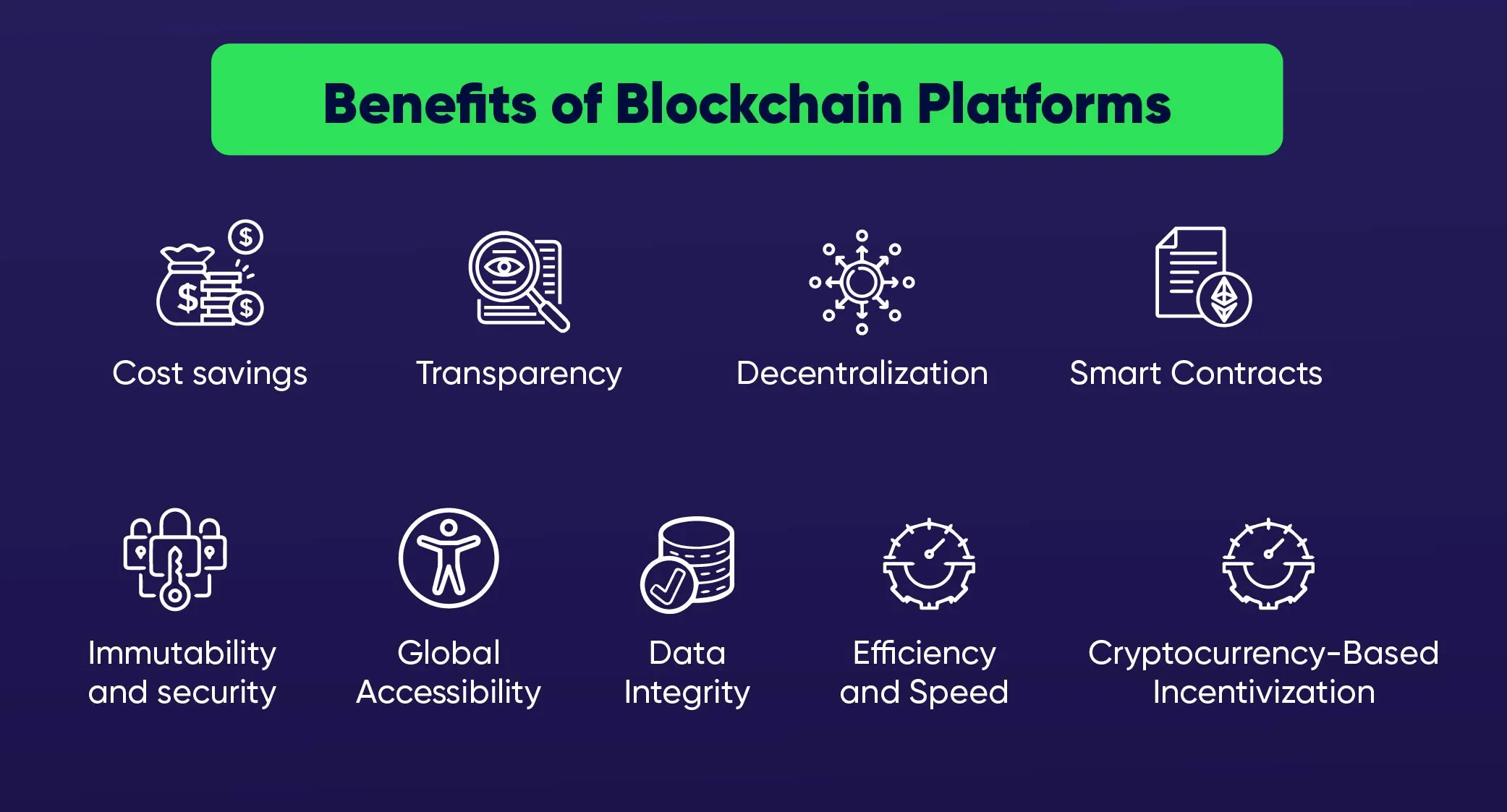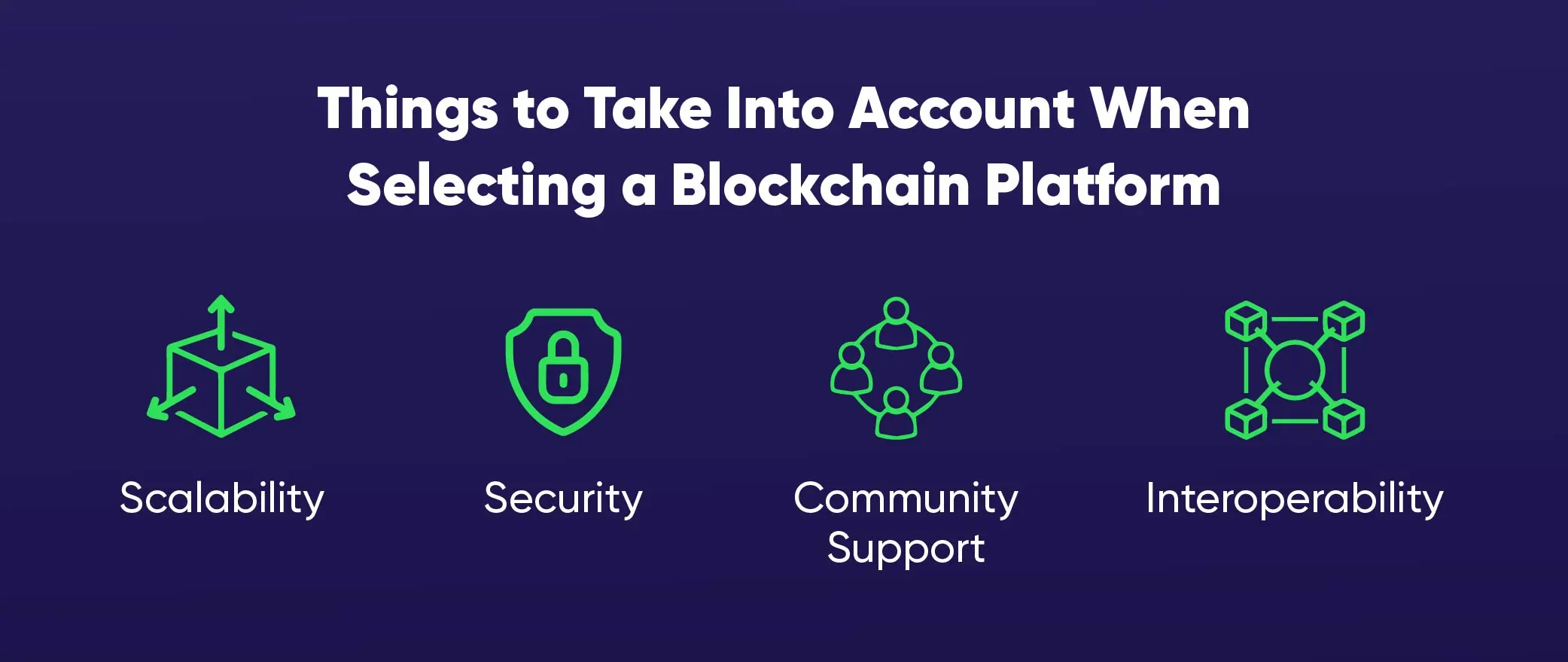
Introduction
Blockchain & Web3 Services Trusted By Leaders
- Develop innovative solutions using our state-of-the-art blockchain expertise.
- Achieve accelerated growth with robust & scalable Web3 consulting.
- Unlock 360-degree security with our top-rated blockchain development.
Top 10 Blockchain Platforms to Lookout in 2024
Blockchain platforms aim to address the limitations of traditional centralized systems by decentralizing control, ensuring security, providing transparency, automating processes through smart contracts, and introducing innovative concepts like decentralized applications (dApps), non-fungible tokens (NFTs), and smart contracts. They eliminate the need for intermediaries, provide a peer-to-peer network, and enhance trust among users. This guide will help you get an idea of which are the “Top 10 Blockchain Platforms to Lookout in 2024” Get into these insights and make informed decisions in selecting the right blockchain solution for your specific use cases.What are Blockchain Platforms?
Blockchain platforms are decentralized digital infrastructures that use blockchain technology to ensure secure, transparent, and tamper-resistant record-keeping. They operate on a network of nodes with equal authority, reducing the need for a central authority. Blockchain technology, a distributed ledger, is fundamental to these platforms, consisting of a chain of blocks. Smart contracts automate processes and eliminate intermediaries. Consensus mechanisms like Proof of Work, Proof of Stake, and Delegated Proof of Stake validate the state of the blockchain. Some platforms use native cryptocurrencies like; Bitcoin and Ethereum.Benefits of Blockchain Platforms
Blockchain platforms are at the forefront of technological innovation due to their many advantages. These benefits cover a wide range of industries and offer answers to persistent problems. Blockchain platforms’ main benefits are listed below:
- Immutability and security: Blockchain systems protect data with sophisticated cryptographic methods. It is almost impossible to remove a block from the chain once it has been added. Because the ledger is distributed and decentralized, it is immune to fraud, hacking, and unauthorized changes, guaranteeing the accuracy of the data that is recorded.
- Transparency: This is one of the fundamental ideas of blockchain technology. Because everyone on the network has access to the same data, a shared and visible ledger is created. Users’ trust is increased by this transparency, which lowers the possibility of mistakes, fraud, and disagreements.
- Decentralization: Blockchain runs on a decentralized network of nodes, in contrast to conventional centralized systems. By doing away with the need for middlemen like banks, this decentralization lowers the possibility of a single point of failure. Additionally, it democratizes network access and control.
- Efficiency and Speed: By eliminating the need for third-party verification and manual reconciliation, blockchain platforms speed up operations. Real-time transaction recording and the automation of intricate procedures by smart contracts result in quicker and more effective operations.
- Cost savings: The automation of procedures and the elimination of middlemen both result in considerable cost savings. Blockchain platforms make transactions more affordable by lowering administrative overhead, minimizing the need for audits, and doing away with intermediaries’ fees.
- Smart Contracts: Blockchain systems frequently facilitate smart contracts, which are self-executing agreements with pre-established guidelines. These contracts eliminate the need for middlemen by automating business procedures, enforcing agreements, and facilitating safe and transparent interactions between parties.
- Global Accessibility: Participants have access to blockchain platforms, which function on a global scale. Due to the removal of geographical barriers, this global accessibility is especially advantageous for businesses involved in international trade, finance, and collaboration.
- Data Integrity: Information cannot be altered or removed once it has been recorded because data integrity is guaranteed by the immutability of blockchain technology. This feature is essential in sectors like supply chain management and healthcare where keeping an accurate and unchangeable record is critical.
- Cryptocurrency-Based Incentivization: Several blockchain platforms offer tokens or native cryptocurrencies as a means of providing incentives to users. These tokens encourage participation and teamwork because they can be used for transactions, rewards, or network participation.
Top 10 Blockchain Platforms to Lookout in 2024
Since the launch of Bitcoin, blockchain technology has undergone a substantial evolution. Several blockchain platforms are expected to have a big impact on a lot of different industries by 2024. These platforms meet the increasing need for decentralized, transparent, and safe solutions by providing a wide range of features. The following is a carefully compiled list of the top 10 blockchain platforms to watch in 2024:- Ethereum (ETH):
The top blockchain platform is considered Ethereum as it has built its reputation for smart contract functionality, and it continues to be a leader in the blockchain industry. Ethereum is undergoing a major upgrade to Ethereum 2.0, promising enhanced scalability and energy efficiency. The platform’s vibrant ecosystem includes decentralized finance (DeFi) solutions, NFT marketplaces, and more.
- Binance Smart Chain (BSC):
BSC Blockchain considered as second most famous because of its quick transaction times feature as well as an inexpensive fee. That is why it has become well-known. Moreover, Its user base is expected to increase in 2024 as it has grown in popularity as a solution for DeFi projects and decentralized applications (dApps).
- Cardano
Cardano is the third-most top blockchain platform as it distinguishes itself with a focus on scalability, sustainability, and interoperability. The platform utilizes the Ouroboros consensus algorithm, aiming to provide a secure and scalable infrastructure for the development of complex smart contracts and decentralized applications.
- Polkadot
Polkadot blockchain network takes a unique approach to interoperability. It is considered the fourth top as with its relay chain, Polkadot facilitates seamless communication between different blockchains. The platform empowers developers to create custom blockchains, fostering a more interconnected and collaborative blockchain ecosystem.
- Solana (SOL):
Solana has gained attention for its impressive throughput and low transaction costs. Built for high-performance decentralized applications and crypto projects, Solana utilizes a unique consensus mechanism called Proof of History to optimize transaction processing speed.
- Avalanche (AVAX):
Avalanche prides itself on achieving sub-second transaction finality. This platform supports the deployment of custom blockchains, offering developers flexibility and scalability. Avalanche’s ambition is to provide a platform for building decentralized applications with unparalleled speed and efficiency.
- Chainlink (LINK):
Chainlink operates as a decentralized oracle network, connecting smart contracts with real-world data. While not a standalone blockchain, Chainlink’s role in ensuring accurate and reliable data feeds to smart contracts is fundamental. Its decentralized nature contributes to the security of various blockchain applications.
- NEAR Protocol (NEAR):
NEAR Protocol focuses on user-friendly blockchain solutions. Utilizing sharding for scalability, NEAR aims to make blockchain accessible to a broader audience. With its emphasis on simplicity and performance, NEAR is positioned as an excellent choice for developers creating user-centric decentralized applications.
- Filecoin (FIL):
Filecoin tackles the challenge of decentralized storage. By incentivizing users to share their storage space, Filecoin creates a secure and decentralized network for storing data. As the demand for decentralized storage solutions grows, Filecoin’s role in this space becomes increasingly crucial.
- Stellar (XLM)
Stellar is a decentralized blockchain platform designed for efficient cross-border payments and global financial inclusion. It features fast, low-cost transactions, anchors, a built-in decentralized exchange, and smart contracts. Despite competition and regulatory uncertainties, Stellar’s adaptability and community-driven ethos make it a significant player in decentralized finance.
Why Blockchain Platforms are Important in 2024
Blockchain platforms are essential to the development of technology, and their importance goes well beyond just cryptocurrencies. By 2024, these platforms will have a significant impact on several industries, such as supply chain management, healthcare, and finance. Blockchain platforms are significant because they can lay the groundwork for safe, open, and decentralized solutions, which will ultimately lead to lower costs and better teamwork. Blockchain Platforms: Blockchain technology is no longer limited to the world of cryptocurrencies. They have developed into adaptable solutions with uses in many different sectors. Impacting Several Industries: Blockchain is revolutionizing data storage, verification, and sharing in several industries, including supply chain management, healthcare, and finance. The Innovation Infrastructure: These platforms offer the essential framework for promoting creativity. Their decentralization and security guarantees foster an environment that is favorable for revolutionary advancements.Things to Take Into Account When Selecting a Blockchain Platform:
Choosing the best blockchain platform is an important choice that requires careful consideration of several variables.
- Scalability: To support expansion and higher transaction volumes, the platform must be able to scale according to the requirements of the project.
- Security: To protect data and transactions, strong security measures—such as encryption and consensus methods—are essential.
- Community Support: Within the platform’s ecosystem, continuous development, problem-solving, and cooperation are ensured by active and involved community support.
- Interoperability: The platform’s ability to work with other blockchains and systems improves its usefulness and enables a smooth integration with the current infrastructure.